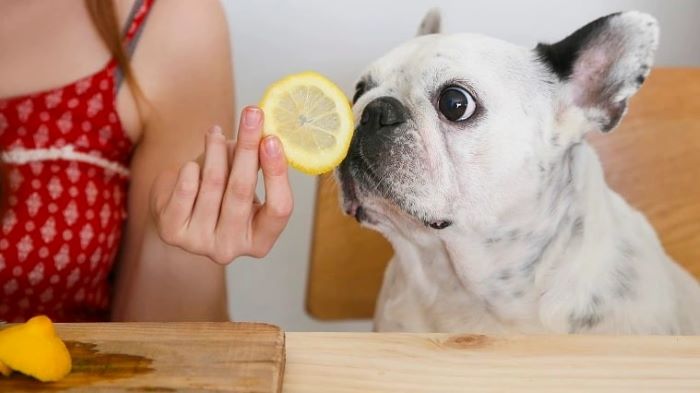Have you ever given a slice of lemon to your dog to check his reaction? Well, you shouldn’t do that. Lemons are citrus fruits which consist of vitamin C and fibres. For humans, this act as a flavouring and detoxicating agent, but is it safe for your pup? and Can Dogs Eat Lemons?

In this article, you’ll find out about Can you give your dogs lemon or not? Let’s see!
You Might Also Like:
Can Dogs Eat Lemons?
No, dogs cannot eat the lemons. Lemons are toxic for dogs as they contain many toxic components like citric acid. This toxic substance can affect the dog’s health badly. Apart from citric acid lemon also consists of rind, which can lead to vomiting, diarrhea and even damage the liver of the dog.
Feeding your dog lemon can also lead to gastric obstruction in your dog. If your dog is allergic to lemon then it can further deteriorate their health and increase the health complications. Moreover, lemons are sour in taste which might not go well with your dog’s taste buds.
Are Lemons Safe for Dogs?
The answer to this question is NO. You should not give lemons as they are not safe for your pooch. The flesh like part of lemon is not toxic, but it could make your doggy sick. This fruit has sour and acidic taste which can lead to vomiting, GI upset, diarrhoea and mouth irritation in these furry pals.
Lemon peels, seeds and stem have psoralen, which is dangerous for your furry pals and cause photosensitivity, liver damage, skin irritation and CNS depression.[1] Also, it is advised to avoid use of Lemon essential oil on dogs and if ingested it can cause toxicity.
We as humans enjoy having a lemonade on a hot Sunday afternoon to feel refreshing. So, you might wonder, Can you give dogs lemon water? Well, it is recommended to not give such sugar containing products to your pet as it can lead to obesity and other health conditions.

Do you want to know if tomatoes are safe for dogs? Check out our article “can dogs eat tomatoes” for more tips
What to Do if Your Dog Eats a Lemon?
If your dog has eaten a lemon by accident, then it is unlikely to cause serious harm. However, you should look out for serious symptoms like drooling, diarrhoea, lethargy and others like difficulty in walking.
If you observe any of these symptoms, then you should consult a veterinarian immediately. Your vet might induce vomiting to avoid toxicity.
What Fruits Can Dog Eat?
Lemon is not a good fruit for your canine pet, but there are other fruits which dogs can eat, like apples, blueberries, strawberries and bananas.[2] Apples are rich in vitamin C and A. But, before feeding anything to your dog, remove seeds and core before feeding it to your pup.
Apple is a safe fruit for your dog, and it keeps their teeth clean and freshen their breath, just make sure the fruit pits are removed as some may contain cyanide.[3] Also, Bananas are a delicious treat for dogs, and they are high in potassium, magnesium, vitamin B6 and fibre. They even control the blood pressure and digestion.

However, they are high in sugar, so it is preferable to give them bananas occasionally. Low calorie fruits like blueberries are healthy for your dog, and they protect your dog from inflammation, oxidative stress and even cancer. You can give them fresh or as a frozen snack.
Strawberries are rich in vitamin C, folic acid, fibre and manganese. They help to boost your dog’s immune system and metabolism. They are also rich in sugar, so you have to limit their amount.
There are many fruits that are safe and healthy for dogs to eat, such as apples, bananas, blueberries and strawberries. However, some fruits like grapes contain toxins that are harmful to dogs, and can potentially cause kidney failure. So it’s important to ask “can I feed my dog grapes?”
FAQs
Can a dog lick a lemon?
Yes, a single lick of lemon won’t hurt your dog, but if it is ingested in huge quantity then it will make your dog sick. Lemon contains high quantity of citric acid in them, and it creates toxicity and stomach issues in them.
How toxic is lemon juice to dogs?
Lemon juice is not toxic, but it should not be given because it is high in citric acid, which is responsible for causing diarrhoea and stomach issues. There are other fruit juices which are very healthy for your pup.
Are there any fruits that dogs can’t eat?
Every other fruit is beneficial for your dog, but the only thing is you should avoid giving fruits which have seeds in it because certain seeds contain cyanide, and it is harmful for our pooches.
Can I use lemon juice or lemon oil to deter my dog from chewing?
No, you should not use lemon juice or lemon oil to deter your dog from chewing, as lemon juice has high amount of citric acid which is toxic and also lemon has limonene and linalool which are natural insecticide that harm your dog’s liver. Topical irritation can also occur because of direct contact with essential oil.
Conclusion
To sum up, Lemon is not given to dogs as it contains certain components which are dangerous for your pup’s health. They cause gastrointestinal issues, vomiting, diarrhoea and other symptoms. However, certain fruits are given but without seeds, as certain seeds have cyanide in them.
Also in some fruits a compound called psoralen is present which cause photosensitivity like reactions. But, there are certain fruits which you can give in moderation like strawberries, blueberries and apple are given to provide vitamin A and regulate the immune system and digestion in doggos.
There are several foods that you can give to your puppy, but it should be in moderation and should have fewer calories and sugar. As some food can cause obesity in them. And, if you observe any serious symptoms, then you should contact a veterinarian immediately.
Did you know dogs can also eat veggies like swede? Check out our guide on can dogs have swede for more tips.
References:
- Wu, S., Han, J., Feskanich, D., Cho, E., Stampfer, M. J., Willett, W. C., & Qureshi, A. A. (2015). Citrus Consumption and Risk of Cutaneous Malignant Melanoma. Journal of Clinical Oncology, 33(23), 2500–2508.
- Sissons, B. (2019, February 15). Which people foods are safe for dogs?
- Center for Veterinary Medicine. (2023). Potentially Dangerous Items for Your Pet. U.S. Food And Drug Administration.






